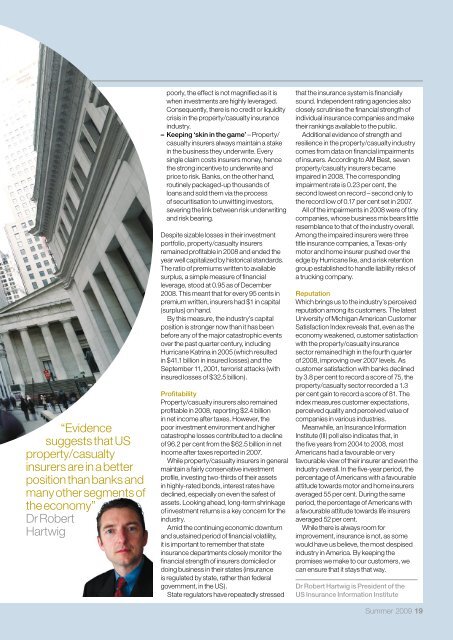The Broker - British Insurance Brokers' Association
The Broker - British Insurance Brokers' Association
The Broker - British Insurance Brokers' Association
You also want an ePaper? Increase the reach of your titles
YUMPU automatically turns print PDFs into web optimized ePapers that Google loves.
“Evidence<br />
suggests that US<br />
property/casualty<br />
insurers are in a better<br />
position than banks and<br />
many other segments of<br />
the economy”<br />
Dr Robert<br />
Hartwig<br />
poorly, the effect is not magnified as it is<br />
when investments are highly leveraged.<br />
Consequently, there is no credit or liquidity<br />
crisis in the property/casualty insurance<br />
industry.<br />
– Keeping ‘skin in the game’ – Property/<br />
casualty insurers always maintain a stake<br />
in the business they underwrite. Every<br />
single claim costs insurers money, hence<br />
the strong incentive to underwrite and<br />
price to risk. Banks, on the other hand,<br />
routinely packaged-up thousands of<br />
loans and sold them via the process<br />
of securitisation to unwitting investors,<br />
severing the link between risk underwriting<br />
and risk bearing.<br />
Despite sizable losses in their investment<br />
portfolio, property/casualty insurers<br />
remained profitable in 2008 and ended the<br />
year well capitalized by historical standards.<br />
<strong>The</strong> ratio of premiums written to available<br />
surplus, a simple measure of financial<br />
leverage, stood at 0.95 as of December<br />
2008. This meant that for every 95 cents in<br />
premium written, insurers had $1 in capital<br />
(surplus) on hand.<br />
By this measure, the industry’s capital<br />
position is stronger now than it has been<br />
before any of the major catastrophic events<br />
over the past quarter century, including<br />
Hurricane Katrina in 2005 (which resulted<br />
in $41.1 billion in insured losses) and the<br />
September 11, 2001, terrorist attacks (with<br />
insured losses of $32.5 billion).<br />
Profitability<br />
Property/casualty insurers also remained<br />
profitable in 2008, reporting $2.4 billion<br />
in net income after taxes. However, the<br />
poor investment environment and higher<br />
catastrophe losses contributed to a decline<br />
of 96.2 per cent from the $62.5 billion in net<br />
income after taxes reported in 2007.<br />
While property/casualty insurers in general<br />
maintain a fairly conservative investment<br />
profile, investing two-thirds of their assets<br />
in highly-rated bonds, interest rates have<br />
declined, especially on even the safest of<br />
assets. Looking ahead, long-term shrinkage<br />
of investment returns is a key concern for the<br />
industry.<br />
Amid the continuing economic downturn<br />
and sustained period of financial volatility,<br />
it is important to remember that state<br />
insurance departments closely monitor the<br />
financial strength of insurers domiciled or<br />
doing business in their states (insurance<br />
is regulated by state, rather than federal<br />
government, in the US).<br />
State regulators have repeatedly stressed<br />
that the insurance system is financially<br />
sound. Independent rating agencies also<br />
closely scrutinise the financial strength of<br />
individual insurance companies and make<br />
their rankings available to the public.<br />
Additional evidence of strength and<br />
resilience in the property/casualty industry<br />
comes from data on financial impairments<br />
of insurers. According to AM Best, seven<br />
property/casualty insurers became<br />
impaired in 2008. <strong>The</strong> corresponding<br />
impairment rate is 0.23 per cent, the<br />
second lowest on record – second only to<br />
the record low of 0.17 per cent set in 2007.<br />
All of the impairments in 2008 were of tiny<br />
companies, whose business mix bears little<br />
resemblance to that of the industry overall.<br />
Among the impaired insurers were three<br />
title insurance companies, a Texas-only<br />
motor and home insurer pushed over the<br />
edge by Hurricane Ike, and a risk retention<br />
group established to handle liability risks of<br />
a trucking company.<br />
Reputation<br />
Which brings us to the industry’s perceived<br />
reputation among its customers. <strong>The</strong> latest<br />
University of Michigan American Customer<br />
Satisfaction Index reveals that, even as the<br />
economy weakened, customer satisfaction<br />
with the property/casualty insurance<br />
sector remained high in the fourth quarter<br />
of 2008, improving over 2007 levels. As<br />
customer satisfaction with banks declined<br />
by 3.8 per cent to record a score of 75, the<br />
property/casualty sector recorded a 1.3<br />
per cent gain to record a score of 81. <strong>The</strong><br />
index measures customer expectations,<br />
perceived quality and perceived value of<br />
companies in various industries.<br />
Meanwhile, an <strong>Insurance</strong> Information<br />
Institute (III) poll also indicates that, in<br />
the five years from 2004 to 2008, most<br />
Americans had a favourable or very<br />
favourable view of their insurer and even the<br />
industry overall. In the five-year period, the<br />
percentage of Americans with a favourable<br />
attitude towards motor and home insurers<br />
averaged 55 per cent. During the same<br />
period, the percentage of Americans with<br />
a favourable attitude towards life insurers<br />
averaged 52 per cent.<br />
While there is always room for<br />
improvement, insurance is not, as some<br />
would have us believe, the most despised<br />
industry in America. By keeping the<br />
promises we make to our customers, we<br />
can ensure that it stays that way.<br />
Dr Robert Hartwig is President of the<br />
US <strong>Insurance</strong> Information Institute<br />
Summer 2009 19


